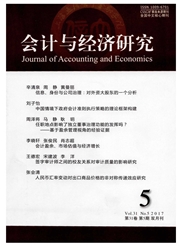

 中文摘要:
中文摘要:
机构投资者已经成为我国资本市场的重要组成部分,在公司治理中的作用日益突出。基于2008-2012年沪深A股的经验数据,研究了不同类型的机构投资者持股对公司盈余管理的影响,并分析了CEO的政治关联在其中的调节和中介作用机制,考察了企业不同产权和不同经济区域下,该作用机制的效果和表现。研究发现:基金持股和QFII持股显著降低了公司的正向盈余管理,社保基金持股对此无影响;机构持股对负向盈余管理的影响不显著;CEO的中央政治关联和CEO的政治关联强度显著降低了机构投资者持股对正向盈余管理的抑制作用,民营企业和西部地区企业的CEO政治关联也显著削弱了机构持股对正向盈余管理的抑制效应。
 英文摘要:
英文摘要:
Institutional investors have been an important part of China's capital market and their role in corporate governance has been increasingly prominent. Using the data of listed firms in Shanghai and Shenzhen A-shares from 2008 to 2012,this study examines the relationship between different types of institutional investors and earnings management,and investigates how such effect is further moderated by CEO political connections,firm ownership and its economic region. The result shows that fund and QFII holdings significantly reduce the positive earnings management but the SSF has no effect; the relationship between the institutional ownership and negative earnings management is not significant. However,both CEO's central political connections and the strength of political connections reduce the negative effect of institutional holdings on positive earnings management; the CEO's political connections of private firms and firms in western regions also reduce the above main effect.
 同期刊论文项目
同期刊论文项目
 同项目期刊论文
同项目期刊论文
 期刊信息
期刊信息
